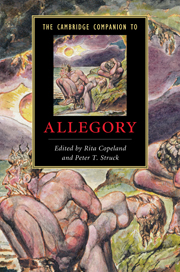Introduction
Published online by Cambridge University Press: 28 January 2011
Summary
The definition of allegory is found in understanding its history. The subject of allegory is vast, comprising many different practices of writing, interpreting, and representing. It is bound up with developments not only in literature and art, but also in mythology, religion, rhetoric, and intellectual culture over the centuries. Thus any theoretical statement about allegory that seeks to capture its essence can only be as good as the historical understanding on which it is founded. This volume seeks to provide that historical perspective. It traces the development of allegory in the European tradition from antiquity to the modern era, emphasizing its progress through literary culture. The essays assembled here traverse the fields that inform allegorical thought and practice in literature and in textual interpretation. Within the broad scope of the European tradition we incorporate the emergence of allegory in ancient Greece and Rome, Judaism, Christianity, and Islam. We begin with Greek antiquity, showing how the earliest systems of allegory arose in poetry in relation to philosophy, mystery religions, and hermeneutics or interpretation. By proceeding chronologically, this volume accounts for how allegory came to be understood, by late antiquity and the early Middle Ages, as both a theological problem and a literary device, or how sacred and secular conceptions of allegory could be seen to co-exist in the same text.
- Type
- Chapter
- Information
- The Cambridge Companion to Allegory , pp. 1 - 12Publisher: Cambridge University PressPrint publication year: 2010
- 6
- Cited by



